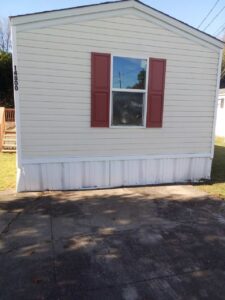In the dynamic real estate landscape, understanding the mobile home market value is crucial for buyers and sellers alike. Whether you’re looking to invest or sell your property, comprehending the factors that influence a mobile home’s worth can make or break a deal. From location and age to condition and amenities, various elements play a pivotal role in determining the market value of mobile homes. By grasping these nuances, you can ensure a fair price and optimize your investment returns. Stay ahead in the mobile home market by decoding the intricacies of valuation and leveraging this knowledge to your advantage. In this article Factors Affecting Mobile Home Value we will discuss all these aspects.

Key Takeaways
Consider the age of the mobile home, as newer homes tend to hold their value better.
Evaluate the size of the mobile home, as larger homes typically have higher values.
Pay attention to the materials used in construction, as quality materials can increase the value.
The inclusion of appliances can impact the value of a mobile home positively.
Be cautious with home additions, as they may not always increase the value proportionally.
Local housing market trends play a significant role in determining the value of a mobile home.

Key Factors Influencing Mobile Home Value
Location
The location of a mobile home plays a significant role in determining its market value. Homes situated in desirable areas with good schools, low crime rates, and access to amenities like parks and shopping centers tend to have higher values. On the other hand, homes in remote or less developed areas may have lower valuations.
Condition and Amenities
The condition of a mobile home is crucial in assessing its value. Well-maintained homes with updated features, such as modern appliances, new flooring, and fresh paint, generally command higher prices. The presence of amenities like a garage, deck, or landscaping can positively impact the value of a mobile home.
Market Trends and Economic Factors
Market trends and economic factors also play a vital role in determining the value of mobile homes. Fluctuations in the real estate market, interest rates, and overall economic conditions can influence the demand for mobile homes. For instance, during periods of economic growth, the demand for affordable housing options like mobile homes may increase, leading to higher prices.
Impact of Home Age
Construction Date
Mobile homes, also known as manufactured homes, differ based on their age. The construction date plays a crucial role in determining the distinction between these two types of homes. Older mobile homes are often categorized as pre-HUD (Department of Housing and Urban Development) code homes, while newer ones adhere to modern building standards.
Depreciation Over Time
As mobile homes age, they tend to experience a depreciation in value. This decline is primarily due to wear and tear, outdated features, and maintenance issues that arise with older homes. Prospective buyers often consider the date of construction to assess the potential costs of repairs and renovations required to bring the home up to current standards.
Benefits of Newer Models
Newer mobile homes offer several advantages over their older counterparts. These models boast advanced technology integration, energy-efficient features, and improved structural integrity. Modern mobile homes are designed to comply with modern standards for safety, durability, and energy efficiency, making them more appealing to buyers seeking a long-term investment.
Role of Home Size
Square Footage
Home size, specifically square footage, plays a crucial role in determining the market value of a mobile home. Larger homes generally command higher prices due to offering more living space and amenities. Buyers often prioritize spaciousness, leading to increased interest in larger homes.
Buyers are willing to pay more for a larger home as it provides them with additional comfort and flexibility. A larger home allows for more customization options and can accommodate growing families or individuals requiring extra space. However, it’s essential to note that maintenance costs may also increase with a larger home.
Single-Wide vs. Double-Wide
When comparing single-wide and double-wide mobile homes, there is a noticeable difference in value. Double-wide homes typically have a higher market value than single-wide homes due to their larger size and enhanced features. The additional square footage in double-wide homes translates to increased living space and improved functionality.
Buyers often perceive double-wide homes as more desirable due to their spacious layout and modern design elements. The extra width in double-wide homes allows for larger rooms, better flow between spaces, and the potential for additional amenities such as multiple bathrooms or walk-in closets.
Layout and Room Configuration
The layout and room configuration of a mobile home significantly influence its perceived market value. An open-concept layout with well-defined living areas is generally preferred by buyers as it creates a sense of spaciousness and connectivity within the home. Homes with efficient room configurations that maximize usable space tend to attract more interest from potential buyers.
Buyers are drawn to mobile homes with functional layouts that cater to their lifestyle needs. Homes with well-designed kitchens, ample storage space, and strategically placed bedrooms often hold higher value in the market. Homes with attractive features such as vaulted ceilings or energy-efficient upgrades can further enhance their perceived value.

Materials Used in Construction
High-Quality Materials
Mobile homes constructed using high-quality materials exhibit enhanced durability and aesthetic appeal. Improved building practices have revolutionized the industry, ensuring longevity and structural integrity.
The use of premium materials such as energy-efficient windows not only reduces utility costs but also elevates the overall market value. These features attract environmentally-conscious buyers seeking sustainable living options.
Energy-Efficient Features
Incorporating energy-efficient elements like insulation and HVAC systems can significantly impact a mobile home’s market value. Buyers prioritize lower energy bills, making these upgrades key selling points.
By investing in federal manufactured home construction standards, builders ensure compliance with energy efficiency regulations. This adherence boosts the property’s value by offering long-term cost savings to potential buyers.
Aesthetic Upgrades
Aesthetically pleasing upgrades play a crucial role in attracting buyers and increasing market value. Simple enhancements like modern fixtures, flooring, and paint can transform a mobile home’s interior, making it more appealing to prospective buyers.
Land improvement options, such as landscaping and exterior renovations, also contribute to a mobile home’s curb appeal. These small changes can have a significant impact on the property’s perceived value in the eyes of potential buyers.
Importance of Included Appliances
Most Valuable Appliances
Mobile homes with modern appliances such as refrigerators, stoves, and dishwashers tend to have higher market values. These appliances are essential for daily living and attract potential buyers looking for convenience.
Energy-Efficient Trend
The trend towards energy-efficient appliances is gaining momentum in the mobile home market. Buyers are increasingly prioritizing appliances that reduce energy consumption, leading to lower utility bills. This shift reflects a growing awareness of environmental sustainability.
Impact on Buyer Preferences
Buyers are willing to pay more for a mobile home with energy-efficient appliances due to the long-term cost savings they offer. These appliances contribute to a more comfortable living environment by maintaining consistent temperatures and reducing noise levels.
Condition and Age Factors
The condition and age of appliances play a crucial role in determining the overall value of a mobile home. Newer appliances in excellent condition can significantly increase the market value, while outdated or malfunctioning appliances may deter potential buyers.
Pros and Cons
Pros: Upgrading to energy-efficient appliances can enhance the appeal and value of a mobile home.
Cons: Older or inefficient appliances may require replacement, impacting the overall valuation.
Effect of Home Additions
Outdoor Living
Porches, decks, and garages are crucial additions that significantly impact a new home’s market value. These features enhance curb appeal and provide additional functional space for homeowners.
Outdoor living spaces have become increasingly popular in today’s real estate market. Homebuyers are drawn to properties with well-designed porches and decks, offering a seamless transition between indoor and outdoor living.
Investing in a porch or deck can yield a high return on investment. According to studies, homeowners can recoup a significant portion of the costs associated with adding these features when selling their property.
Garage Conversion
Converting a garage into an additional living space is another way to increase the bedrooms in a home, thus boosting its market value. This transformation adds square footage and enhances the overall functionality of the property.
Garage conversions offer versatility, allowing homeowners to create a guest suite, home office, or recreational area. This adaptability appeals to buyers seeking customizable living spaces tailored to their specific needs.
When considering home additions like garage conversions, it is essential to evaluate the potential return on investment. Research shows that well-executed garage conversions can substantially increase the resale value of a home.
Local Housing Market Influence
Regional Dynamics
Regional real estate market conditions play a crucial role in determining the mobile home market value. Areas experiencing high demand for family housing often see an increase in home prices and home values. Conversely, regions facing housing affordability challenges may witness a decline in home values. Understanding these dynamics is essential for both homebuyers and sellers.
Proximity to Amenities
The proximity of mobile homes to amenities such as schools, parks, and shopping centers significantly impacts their market value. Mobile homes located near quality schools or recreational facilities tend to attract more buyers, leading to higher home prices. On the other hand, properties lacking easy access to essential amenities may struggle to maintain their market value.
Seasonal Trends
Seasonal trends can also influence the mobile home market, affecting both supply and demand. During the spring and summer months, when the weather is favorable, there is typically an uptick in home buying activity. This surge in demand can drive up home prices, making it a competitive time for both buyers and sellers. In contrast, the fall and winter seasons may see a slowdown in the housing market, potentially leading to lower home values.

Methods to Assess Mobile Home Value
Obtain Free Report
To assess mobile home value, start by obtaining a free mobile home value report online. Websites like mobilehomesell.com offer this service for initial assessment.
Consider inputting details such as the manufactured housing appraisal guide and the specific features of your home to generate an estimate.
Utilize Online Platforms
Online platforms provide a convenient way to compare your mobile home’s value with similar properties in the market.
By utilizing these tools, you can gain insights into the current market trends and make informed decisions about selling or upgrading your mobile home.
Hire Professional Appraiser
For a more accurate valuation, consider hiring a professional appraiser specialized in mobile homes. A professional used home value report prepared by an expert offers detailed insights into your property’s worth.
Appraisers assess various aspects such as the condition of the home, its location, amenities, and recent sales data to provide a comprehensive valuation report.
Understanding Different Types of Values
Market Value
Market value is the price at which a property would sell in a competitive market. It’s influenced by factors like location, demand, and economic conditions. Market value fluctuates based on current real estate trends and buyer interest.
Appraised Value
An appraised value is an evaluation of a property’s worth by a licensed appraiser. They consider factors like the property’s condition, size, and comparable sales in the area. Appraised value provides an unbiased estimate based on the property’s features.
Assessed Value
The assessed value is the value assigned to a property for tax purposes. Local governments use this value to calculate property taxes. It’s crucial to note that assessed value may differ from market value due to varying assessment methods and tax regulations.
Differences in Valuation Methods
Market value reflects the current state of the real estate market and buyer behavior.
Appraised value relies on an expert’s assessment of the property’s characteristics and comparable sales data.
Assessed value is determined by local authorities for tax calculations, often using standardized valuation methods.
Importance of Understanding Values
When buying a mobile home, knowing its market value helps you make informed decisions on pricing and negotiations.
Understanding the appraised value ensures you’re paying a fair price based on the property’s condition and features.
Being aware of the assessed value can help you anticipate annual property tax obligations accurately.
Final Remarks
Considering the key factors that influence the value of a mobile home, such as age, size, construction materials, appliances, and local market conditions, it becomes evident that assessing a mobile home’s value is a multifaceted process. Understanding the nuances of different types of values and the impact of additions can significantly aid you in determining an accurate value for your mobile home. By utilizing the methods discussed in this article, you can confidently evaluate your mobile home’s worth and make informed decisions regarding buying or selling in the dynamic mobile home market.
Take charge of understanding how these factors play into the value of your mobile home. Empower yourself with the knowledge to navigate the complexities of assessing mobile home value effectively. Armed with this information, you can maximize the value of your investment and make sound real estate decisions.
Frequently Asked Questions
What are the key factors influencing the value of a mobile home?
Mobile home value is influenced by factors like age, size, construction materials, included appliances, home additions, and local housing market conditions. Understanding these factors can help assess the overall value accurately.
How does the age of a mobile home impact its market value?
The age of a mobile home plays a significant role in determining its market value. Older homes may have depreciated in value due to wear and tear, while newer homes tend to retain higher values.
Why is the size of a mobile home important in determining its value?
The size of a mobile home directly affects its value. Larger homes typically command higher prices due to increased living space and amenities, making them more desirable in the market.
How do different types of construction materials affect the market value of a mobile home?
The materials used in constructing a mobile home can impact its market value. High-quality, durable materials can increase the overall value and longevity of the home, while cheaper materials may lower its value.
What role do included appliances play in determining the value of a mobile home?
Included appliances can add significant value to a mobile home. Upgraded or new appliances enhance the appeal and functionality of the property, potentially increasing its market worth.
Be sure to check out our other articles:
The Best Mobile Home Occasion: A Buyer’s Guide

